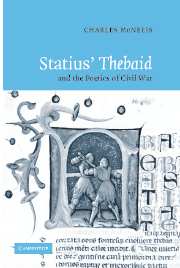Chapter 1 - Gods, humans and the literary tradition
Published online by Cambridge University Press: 22 September 2009
Summary
At the start of the Thebaid, Eteocles rules over Thebes and Polynices has been exiled. In the course of his wanderings, a terrible storm drives Polynices to the doorway of Adrastus, the king of Argos. Tydeus, who has been exiled from his native Calydon, happens to seek shelter at the entrance to the king's house at the same time. The two young men fight over the meagre shelter, and the commotion prompts the king to investigate its cause. When Adrastus sees Polynices wearing the skin of a lion and Tydeus that of a boar, he recalls a prophecy that foretold that his daughters would marry these animals. Believing the two exiles to be his future sons-in-law, he welcomes them into the palace as a religious festival is taking place, and he then explains the origins of the ceremony to the newcomers. The ways in which this aetion illuminates its encompassing narrative and affords deep insights into the gods of the Thebaid will be the subject of this chapter. Specifically, I look at the dissolution of distinctions between heavenly and infernal deities and the implications of this unusual divine arrangement for the poem.
Adrastus' account commences with Apollo's victory over the massive snake-monster Python that had inhabited Delphi. Such mythical fights between sky and earth gods concern the ordering of the universe, and Apollo's victory follows the standard paradigm in which the sky-god gains control.
- Type
- Chapter
- Information
- Statius' Thebaid and the Poetics of Civil War , pp. 25 - 49Publisher: Cambridge University PressPrint publication year: 2007

